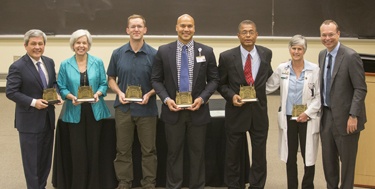
Dr. Harold Thompson, Professor of Clinical Radiology and Chief of Medical Imaging at the VA, was awarded the prestigious R. Michael Rodriguez Award for Teaching Medical Students, Residents and/or Fellows in the Clinical Setting by Jeff Balser, M.D., Ph.D., vice chancellor for Health Affairs and dean of the School of Medicine, at the Spring Faculty Meeting on May 28.
Excellence in Teaching
• R. Michael Rodriguez Award for Teaching Medical Students, Residents and/or Fellows in the Clinical Setting — Harold Thompson, M.D., professor of Clinical Radiology
Thompson earned his Bachelor of Science degree from South Carolina State College, now South Carolina State University in Orangeburg, and his M.D. degree from Howard University. After completing his residency at Howard University Hospital, he served on the faculties of Howard University and Meharry Medical College, where he chaired the Department of Radiology and was Senior Associate Dean. He was also Chief of Radiology, president of the medical staff, and education coordinator for the Vanderbilt Radiology Residency Program at Metropolitan Nashville General Hospital.
Thompson has held joint faculty positions at Meharry and Vanderbilt for more than a decade. He is chief of Medical Imaging for the Tennessee Valley Healthcare System, U.S. Department of Veterans Affairs (VA), which includes two acute care hospitals, in Nashville and Murfreesboro, as well as nine outpatient clinics. Thompson also is part of the radiology team at the Vanderbilt Breast Center.
In part because of what one resident described as his “astounding” knowledge of radiology and anatomy, Thompson is one of the most highly regarded teachers of medical imaging at Vanderbilt. He has received outstanding teacher awards at Howard, Meharry and from the senior radiology residents at Vanderbilt, and in 2013 was named the Department of Radiology and Radiological Sciences Teacher of the Year.
His passion and enthusiasm for teaching have been described as “infectious.” He brings out the best in his students by challenging them “with affirmation” and with a Socratic teaching approach that encourages them to develop their own problem-solving skills and gain deeper understanding on their own. He also is humble enough to appreciate that he can learn from his students – yet another way that he inspires and leads by example. Another colleague described his generous, compassionate and collegial demeanor as a model of professionalism – for both residents and fellow faculty members alike.
